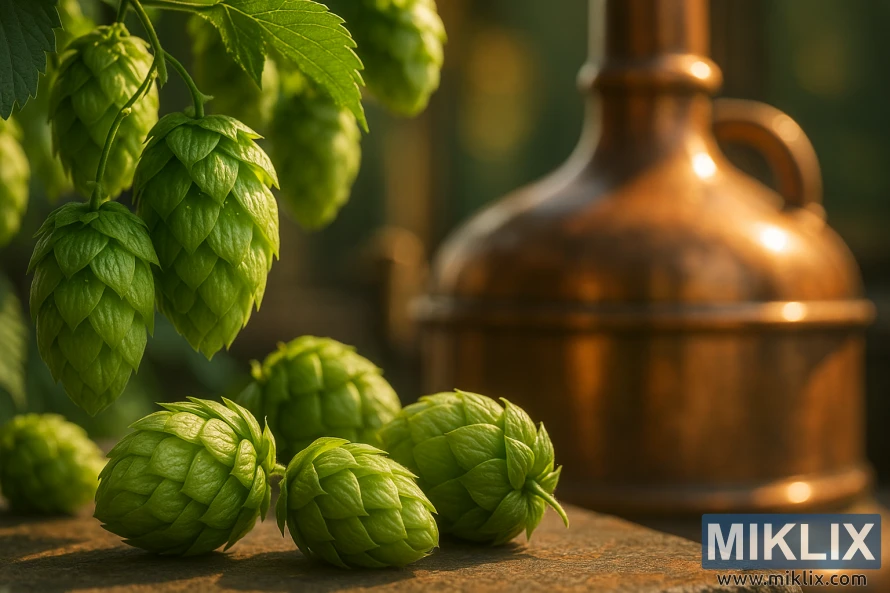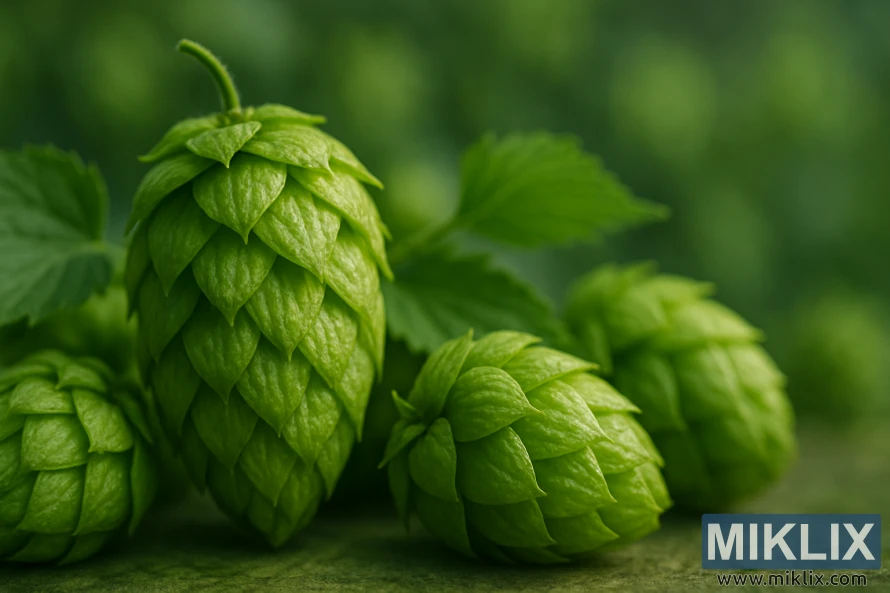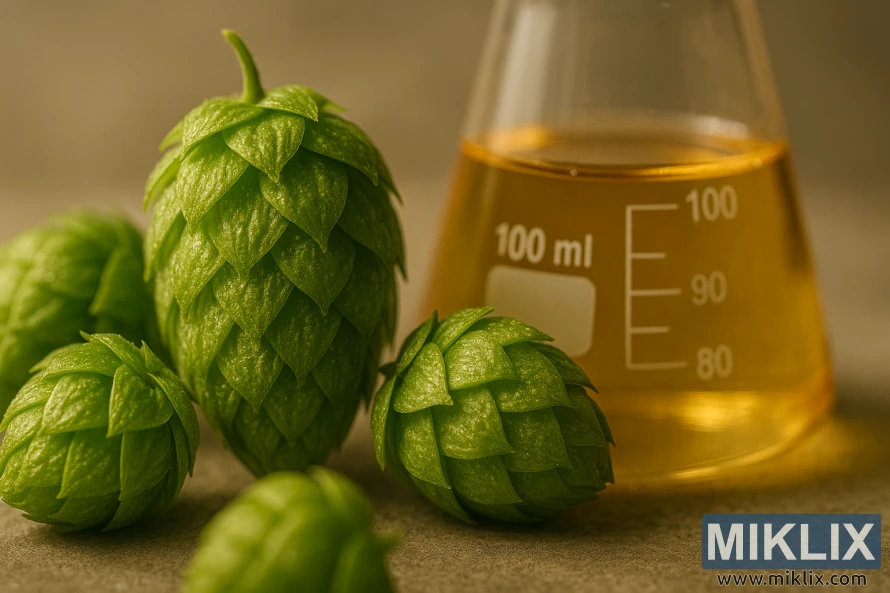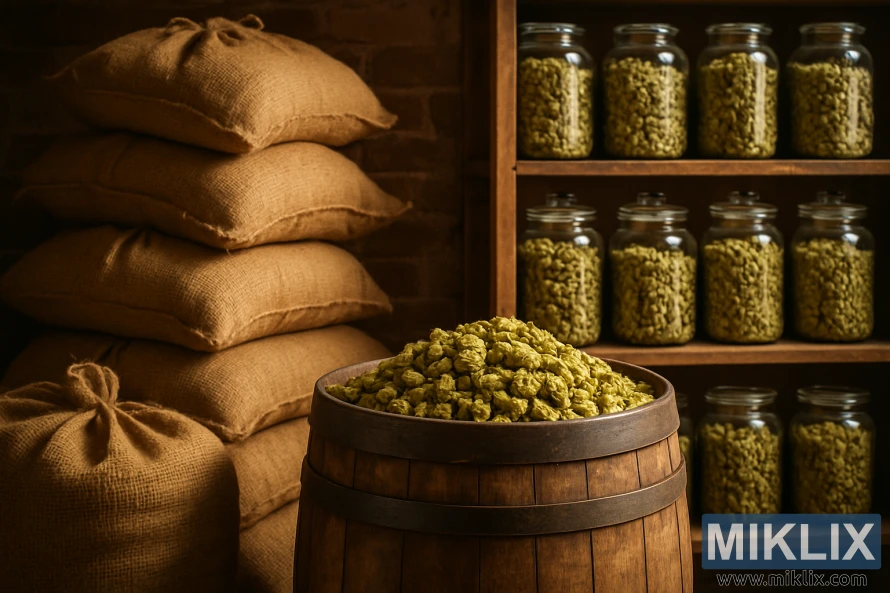Hops in Beer Brewing: Lucan
Published: September 15, 2025 at 7:12:49 PM UTC
Beer brewing is an art that requires a deep understanding of various ingredients, including hops. Lucan hops, hailing from the Czech Republic, are known for their distinct flavor and aroma. They add a unique touch to beer. Lucan hops have a low alpha acid content, typically around 4%. This makes them perfect for brewers aiming to add unique characteristics to their beers without a strong bitterness. Their use in brewing enables the creation of complex and balanced flavors.

Key Takeaways
- Lucan hops are aroma hops from the Czech Republic.
- They have a low alpha acid content, around 4%.
- Ideal for adding distinct flavors and aromas to beer.
- Suitable for brewing styles that require minimal bitterness.
- Can be used to create complex and balanced beer flavors.
Understanding Lucan Hops
Lucan hops have a low alpha acid content, around 4%. This places them in the category of aroma hops. They are used in beer brewing to add a unique and complex character.
Lucan hops are known for their low alpha acid content and distinct flavor and aroma. The alpha acid content is key in determining beer bitterness. Lucan hops, with their low alpha acids, are not used for bittering. Instead, they are added later to preserve their delicate aroma and flavor.
The characteristics of Lucan hops can be broken down into several key components:
- Alpha acid content: Typically around 4%, making them suitable for aroma and flavor.
- Beta acid content: Contributes to the overall flavor and stability of the beer.
- Cohumulone content: Affects the quality of bitterness and the overall hop flavor.
Understanding these components is essential for brewers. It helps them effectively use Lucan hops in their recipes. This ensures the desired flavor and aroma profiles in their beers.
The Distinctive Aroma Profile of Lucan Hops
The aroma of Lucan hops stands out, with floral, fruity, and spicy notes. This makes them a top choice for elevating beer quality. Their complex aroma profile is highly sought after in brewing.
Floral notes in Lucan hops add a delicate, perfumy quality to beers. Fruity notes bring depth and complexity. Spicy notes, on the other hand, offer a warm, aromatic flavor that complements many beer styles.
Brewing techniques are key to unlocking Lucan hops' full flavor. By adjusting hop addition times and boil temperatures, brewers can enhance the extraction of flavor and aroma compounds.
Pale ales, IPAs, and wheat beers are among the styles that benefit from Lucan hops' unique aroma. Their versatility makes them perfect for brewers eager to try new recipes and flavors.
Understanding Lucan hops' aroma profile and how to use them in brewing is essential. This knowledge allows brewers to craft complex, nuanced beers that highlight these exceptional hop varieties.

Essential Growing Conditions for Lucan Hops
Cultivating Lucan hops requires a specific climate and soil type, making their growth conditions unique. The Czech Republic is the primary location for Lucan hop cultivation. Its climate and soil are perfectly suited for these hops.
The ideal climate for Lucan hops includes moderate temperatures and sufficient humidity. Extreme temperatures can harm the yield and quality of the hops. The slow maturation process in regions with seasonal changes is beneficial. It helps in developing the complex aroma profile of Lucan hops.
Lucan hops also have specific soil requirements. They grow best in well-drained, fertile soils with a high nutrient content. The soil's pH level is also critical, with slightly acidic to neutral being preferred. The right climate and soil conditions are key to successful Lucan hop cultivation.
By understanding and replicating these conditions, hop farmers can improve Lucan hop cultivation. This ensures a high-quality yield. Brewers seeking unique hops for their beers will find these efforts rewarding.
Brewing Properties and Alpha Acid Content
For brewers, grasping the brewing properties and alpha acid content of Lucan hops is key. Lucan hops stand out with a low alpha acid content, usually around 4%. This places them firmly in the realm of aroma and flavor hops, not bittering hops.
Their high beta acid content makes Lucan hops perfect for adding complex flavors and aromas to beer. This unique profile positions them as a top pick for brewers aiming to craft beers with distinct characteristics.
When incorporating Lucan hops, brewers must consider their low alpha acid content. This affects the beer's overall bitterness. Given their low alpha acid, Lucan hops are best used in late boil additions or dry-hopping. This maximizes their flavor and aroma contributions.
- Lucan hops are ideal for aroma and flavor additions.
- Their low alpha acid content means they're not typically used for bittering.
- High beta acid content contributes to their unique brewing properties.
By understanding and utilizing the brewing properties of Lucan hops, brewers can craft a broad spectrum of beer styles. These beers will highlight the unique qualities of these hops.

Best Beer Styles for Lucan Hops
The unique aroma of Lucan hops makes them perfect for pale ales and IPAs. These beer styles greatly benefit from Lucan hops' distinct flavor and aroma.
Pale ales and IPAs are known for their hop-forward nature. Lucan hops, with their balanced alpha acids and unique aroma, fit these styles well. They add complexity and depth, making the beer more enjoyable.
For brewers aiming to craft a balanced pale ale, Lucan hops work well alone or blended with others. In IPAs, they contribute to both bitterness and aroma, depending on brewing timing.
Lucan hops are ideal for pale ales and IPAs due to several key characteristics:
- Distinctive aroma profile
- Balanced alpha acid content
- Versatility in brewing applications
Using Lucan hops in pale ales and IPAs allows brewers to create beers that are both flavorful and aromatic. Lucan hops' unique traits make them a top choice for brewers seeking to innovate in these popular styles.
Storage and Preservation Methods
Lucan hops need careful handling and storage to keep their brewing properties intact. The right storage methods are key to preserving their quality and character. This is vital for achieving the desired flavor and aroma in beer.
To keep Lucan hops in top condition, brewers should follow best practices. This includes storing them in airtight containers. This prevents exposure to air, moisture, and light, which can harm hop quality.
- Using airtight containers or vacuum-sealed bags to prevent oxidation.
- Storing hops in a cool, dark place or refrigerating them to slow down degradation.
- Keeping hops away from moisture to prevent the growth of mold and bacteria.
Refrigeration is highly effective in preserving Lucan hops' alpha acids and essential oils. By keeping them at a consistent refrigerated temperature, brewers can maintain their brewing properties.
Proper hop handling and storage are essential in brewing. By adhering to these guidelines, brewers can ensure their Lucan hops retain their unique aroma. This contributes to the overall quality of their beers.

Optimal Timing for Hop Additions
The timing of hop additions is a critical factor in brewing. It greatly influences the final flavor and aroma of the beer. Hops are added at different stages to achieve specific characteristics.
There are three primary techniques for hop additions: bittering hops, flavor hops, and aroma hops. Each has a distinct purpose in the brewing process.
Bittering hops are added early in the boil to contribute bitterness to the beer. The alpha acids in these hops isomerize during the boil. This provides the desired bitterness.
Flavor and aroma hops are added later in the boil or during fermentation. Flavor hops contribute to the beer's flavor profile. Aroma hops enhance the beer's aroma.
Here are some common strategies for hop additions:
- Early boil additions for bitterness
- Late boil additions for flavor and aroma
- Dry hopping for enhanced aroma
Optimal timing for hop additions is critical for achieving the desired flavor and aroma profile in beer. By understanding and applying the different hop addition techniques, brewers can significantly enhance the quality of their beers.
Pairing Lucan Hops with Other Varieties
To craft beers with depth, brewers often pair Lucan hops with complementary or contrasting hop varieties. This technique allows for the creation of complex and unique flavor profiles. It can elevate a beer to new heights.
Complementary hop varieties share similar characteristics with Lucan hops, such as floral or fruity notes. They can enhance these qualities when used together. For instance, pairing Lucan hops with varieties like Saaz or Hallertau can accentuate the beer's aromatic properties. This results in a more refined and sophisticated flavor.
On the other hand, contrasting hop varieties offer different characteristics. They can create an interesting and balanced flavor profile when combined with Lucan hops. For example, the citrus notes of Lucan hops can be nicely contrasted with the piney flavors of varieties like Chinook or Columbus. This adds depth and complexity to the beer.
- Combining Lucan hops with other high-alpha-acid varieties to create a balanced bitterness.
- Pairing Lucan hops with varieties that have complementary flavor profiles to enhance the beer's overall character.
- Using Lucan hops in conjunction with contrasting varieties to add complexity and intrigue to the beer.
By understanding the characteristics of Lucan hops and how they interact with other hop varieties, brewers can experiment with different pairing techniques. This allows them to create unique and captivating beer styles.
Common Brewing Challenges and Solutions
Brewing with Lucan hops offers a rewarding experience, yet it presents its own set of challenges. Brewers often encounter issues like hop creep, hop haze, and unstable hop flavors. These problems can significantly impact the beer's quality.
Hop creep is a major challenge, where hops continue to ferment even after addition. This can lead to over-carbonation or inconsistent flavors. To tackle this, brewers should closely monitor fermentation and adjust hopping schedules as needed.
Hop haze is another issue that can occur with Lucan hops. It's caused by hop polyphenols interacting with proteins, resulting in a cloudy beer. To solve this, brewers can use finings or adjust hopping rates to reduce polyphenol introduction.
Hop flavor instability is also a concern. The unique aroma compounds in Lucan hops can degrade, altering the beer's flavor. To address this, brewers might consider using hop extracts or oils. These provide a more stable source of these compounds.
Some best practices for brewers to overcome these challenges include:
- Carefully monitoring fermentation and adjusting hopping schedules as needed.
- Using finings to reduce haze caused by hop polyphenols.
- Considering the use of hop extracts or oils for more consistent flavor profiles.
By understanding these common brewing challenges and implementing the right solutions, brewers can fully utilize Lucan hops' unique qualities. This way, they can produce high-quality beers.
Commercial Success Stories with Lucan Hops
Several prominent breweries have leveraged Lucan hops to achieve remarkable success in the competitive beer market. By incorporating Lucan hops into their brewing processes, these breweries have been able to create unique and captivating beers. These beers stand out among consumers.
One notable example is the brewery, Sierra Nevada, which has successfully utilized Lucan hops in their pale ales. The distinctive aroma profile of Lucan hops added a complex layer to their beers. This enhancement made their beers more appealing to craft beer enthusiasts.
Another success story comes from Dogfish Head Brewery, which experimented with Lucan hops in their IPA recipes. The result was a series of beers with a unique flavor profile. This resonated well with their customer base.
The success of these breweries can be attributed to several factors. These include the quality of the Lucan hops, the brewing techniques employed, and the ability to innovate and adapt to consumer preferences.
- Quality control in hop selection and brewing processes.
- Innovative brewing techniques that highlight the unique characteristics of Lucan hops.
- Adaptability to changing consumer tastes and preferences.
These commercial success stories underscore the Lucan hops' ability to enhance beer quality. They also highlight the role of Lucan hops in driving business success in the competitive brewing industry.

Calculating Hop Quantities for Different Batch Sizes
The art of brewing is all about precise calculations, none more so than figuring out hop quantities for various batch sizes. Getting the hop quantities right is key to achieving the perfect flavor and aroma in beer.
Brewers can use hop quantity calculators or brewing software to simplify this task. These tools allow brewers to input details like batch size, desired alpha acid content, and hop type. This way, they can accurately determine the amount of hops needed.
- Batch size: The larger the batch, the more hops are required.
- Alpha acid content: Hops with higher alpha acid content are more bitter and may require adjustment in quantity.
- Hop variety: Different hop varieties have unique flavor and aroma profiles that impact the overall character of the beer.
Understanding these factors and using the right tools ensures consistency in beer flavor and aroma across different batch sizes. Whether brewing a small batch or a large commercial quantity, precise hop quantity calculations are vital for achieving the desired outcome.
Quality Control and Testing Methods
Ensuring the quality of Lucan hops is vital for brewing top-notch beers. Breweries use various quality control and testing methods to achieve this goal.
Quality control starts with inspecting hop cones for appearance, aroma, and moisture. Sensory evaluation is key, where experts assess the hops' aroma and flavor profiles.
Laboratory testing is also critical for verifying Lucan hops' quality and composition. Key parameters analyzed include:
- Alpha acid content
- Beta acid content
- Hop storage index
- Moisture content
These tests help brewers understand the hops' brewing properties. This knowledge guides their decisions on hop additions.
Some breweries conduct audits of their hop suppliers to ensure quality standards are met. They verify the origin, handling, and storage practices of the hops.
Through these quality control and testing methods, breweries can guarantee their Lucan hops meet standards. This results in consistent and high-quality beers.
Sustainable Practices in Lucan Hop Production
Lucan hop producers are leading the way in reducing environmental damage through sustainable practices. These efforts not only lessen the ecological footprint of hop farming but also make the brewing industry more eco-friendly.
Organic farming is a cornerstone of sustainable hop production in Lucan. By eschewing synthetic fertilizers and pesticides, organic hop farming minimizes the harmful effects of chemical runoff and soil degradation.
Integrated pest management (IPM) is another vital strategy. IPM takes a holistic approach to pest control, employing methods like crop rotation, biological control, and cultural controls. This approach significantly reduces the reliance on chemical pesticides.
- Reducing water consumption through efficient irrigation systems
- Implementing soil conservation methods to prevent erosion
- Promoting biodiversity within hop fields
Through these sustainable practices, Lucan hop producers can greatly reduce their environmental footprint. At the same time, they maintain the high quality of their hop production.
Conclusion
Lucan hops present brewers with a chance to create a wide range of beer styles, each with its own distinct aroma. By grasping the characteristics and growing conditions of Lucan hops, brewers can refine their brewing methods.
The brewing properties and alpha acid content of Lucan hops make them ideal for various beer styles. It's important to consider the optimal timing for hop additions. Also, pairing Lucan hops with other varieties can help achieve the desired flavor profiles.
In summary, Lucan hops are a versatile ingredient that can elevate the quality and complexity of different beers. By applying the knowledge from this article, brewers can effectively use Lucan hops. This leads to the creation of high-quality beers that showcase the unique attributes of this hop variety.
Further Reading
If you enjoyed this post, you may also like these suggestions:
